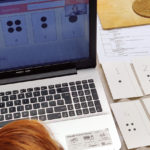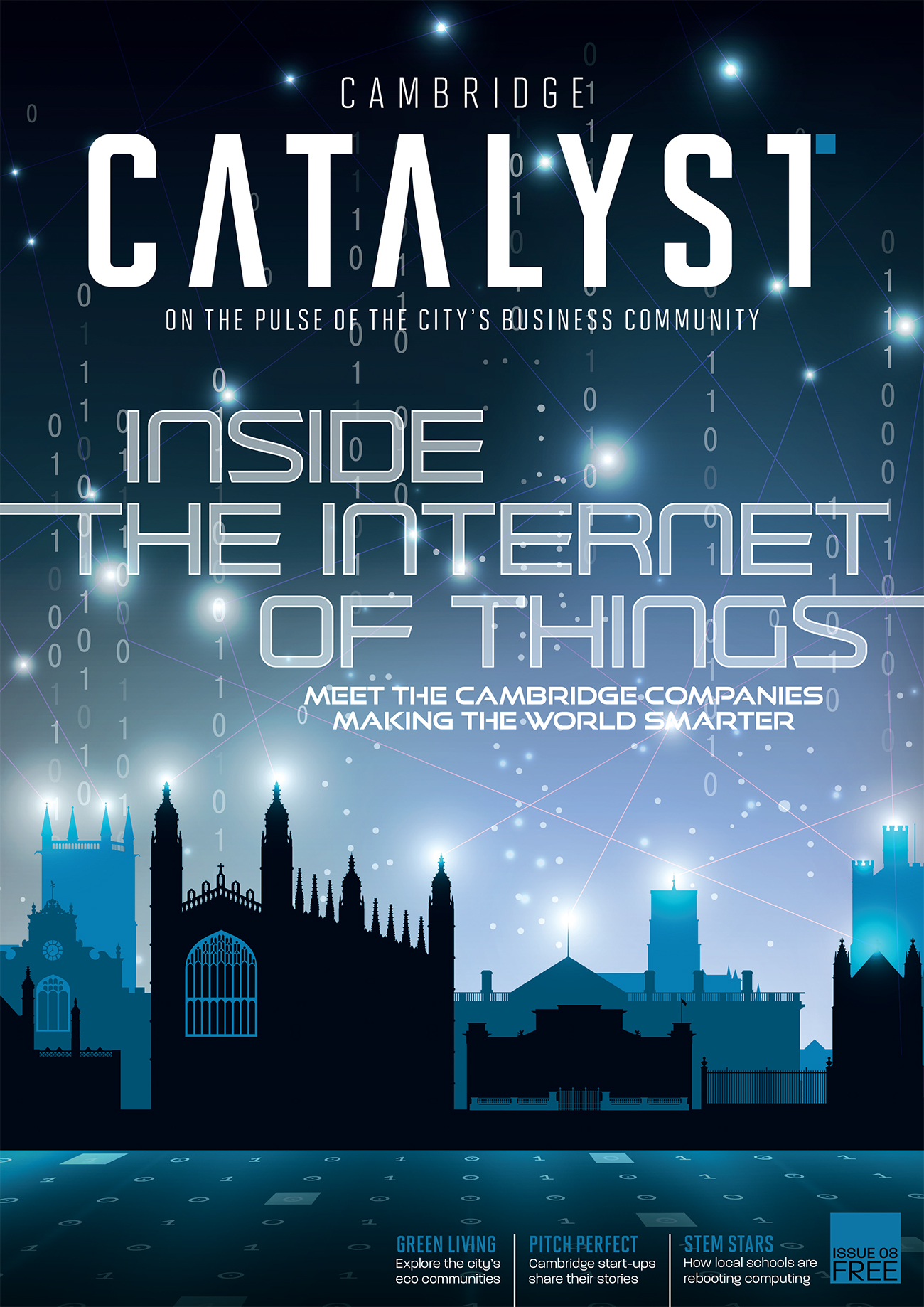
Covid-19: Who you gonna call?
Posted on Oct 2, 2020 by Matthew Gooding
When the Covid-19 pandemic brought the world to a standstill, the Cambridge Cluster got busy doing what it does best: finding innovative solutions to difficult problems. Here, Matthew Gooding takes a look at some of the ways the city’s business community responded to the pandemic
In a shared house on Cambridge’s Oxford Road, three friends watched the spread of Covid-19 across the globe and decided they needed to do their bit to help with the fightback. The trio of housemates – Ray Siems, Evan Martin and Wilson Griffiths – joined another friend, Ravi Solanki, on two projects to assist frontline NHS workers battling the pandemic. The second project, an online portal for the charity HEROES, helped the organisation assist 90,000 frontline staff in three months, earning recognition from the Royal Academy of Engineering in the process.
Their efforts were indicative of the response to the Covid-19 outbreak from across the Cambridge Cluster, with individuals, start-ups and multinationals joining forces to develop solutions to help in the rapidly evolving crisis. As the pandemic moves into the next stage, the city’s brightest minds are sure to play a leading role as society is reshaped and we become accustomed to the ‘new normal’.

Stopping the spread and helping the heroes
Ray is CEO and co-founder of Catalyst AI (no relation) and an alumnus of the University of Cambridge engineering department. He and Ravi, at the time a final-year medical student, first worked together to develop Stop the Spread, a website seeking to provide clear, easy-to-digest information on the pandemic for medics and patients.
“Ravi was on a placement in a hospital, and when the Covid-19 outbreak started we got talking about the lack of information filtering through down to the patient level,” Ray says. “We wanted to see if there was something that we could do to help, because it was clearly an information problem rather than a medical one. And that’s where we came up with the idea to work with him and a few other doctors around Cambridge to try to make a more accessible version of the official NHS information.”
Put together in three days and drawing together information from official sources that, in the early days of the pandemic, was fragmented and hard to digest, the site was a hit with patients and practitioners alike. “We did a soft launch on the Monday, and by the Tuesday we’d had 20,000 hits,” says Ray. Stop the Spread was used by GP practices and clinical commissioning groups, which recommended it to patients. But as official channels began to up their game with coherent, up-to-date advice, the team were given another opportunity to put their talent to use. “As the official information started to become more clear and widely disseminated, there was no longer as much as of a need for Stop the Spread,” Ray says.
“That was around the time the number of people in hospital was vastly increasing, and we could see there was now a need to look at the effect that was having on healthcare workers.” Through a contact on Twitter, the quartet teamed up with Dr Dominic Pimenta to work on a website for his new charity, HEROES, which was set up to support NHS workers during the crisis. Dr Pimenta had signed up former Chelsea and England footballer Joe Cole as an ambassador, and with a media appearance to launch the charity scheduled, the team again had a tight timescale to create something from scratch.
 Diagnostic testing is critical to track the virus, understand epidemiology and suppress transmission
Diagnostic testing is critical to track the virus, understand epidemiology and suppress transmission
“They were going on to Good Morning Britain on the Monday morning at 8am, which left us with less than two days to build a website and an approachable brand that people felt they could trust,” Ray explains.
The resulting site – helpthemhelpus.co.uk – now provides secure end-to-end digital infrastructure to allow NHS workers to apply for and receive financial relief grants digitally. Staff can now submit an application through the HEROES website, while the site also allows members of the public to make donations to the charity, and provides information on a wide range of topics relevant to NHS staff. Crucially, it was also ready for Cole’s date on the Good Morning Britain sofa.
The project was one of 19 schemes across the country to receive a special engineering award from the Royal Academy of Engineering for its ‘transformative’ effect on people’s lives. “The award was a real honour and a surprise,” Rays says. “There must be so many engineers out there who played an important part in the pandemic and we were just the ones lucky enough be recognised.”

Five years’ work in four weeks
Ray and his friends were not the only ones leaping into action as Covid-19 took hold. Teams around the city raced to come up with new ventilator designs as fears rose that hospitals could be overwhelmed. TTP just outside Cambridge was one of the companies that answered the call of the government’s Ventilator Challenge, developing from scratch a machine built with existing parts that could be manufactured rapidly. Within four weeks they had a working product ready to submit to the Medical and Healthcare Products Regulatory Agency (MHRA) for approval.
“Responding to challenging problems is what we do all the time,” says Douglas Bradshaw, who heads up the company’s healthcare activities. “And the government’s not the first client to phone us up and say, “We’ve got a ‘burning tower’, can you help?” The objective was to create a design for a ventilator that could be manufactured in
thousands of units per week. Within three days we had a initial design and within ten days that design was more or less fixed.

“Normally for a project like this you would use bespoke parts, because that gives you more options. But here there was zero chance of doing that because of the timescales involved, so we had to use simple valves and sensors that were available in their thousands. We had to work closely with the government to ensure supplies were available and we have ended up with a product that can be built from components and raw materials that are available in vast numbers, and we managed to source all the components bar one from UK suppliers.”
Given that this process usually takes three to five years, to turn something around in a matter of weeks is a testament to the skills in TTP’s team. The design is now ready to go into rapid production should the pandemic escalate again and put more pressure on clinics.
Douglas says the lessons learned during the project can be taken forward into TTP’s work designing cutting-edge products for clients around the world. “I think it showed me that the way our team works really helped on this project,” he says. “With CoVent, we moved through the phases of the project quickly. Because we have a flat organisational structure, people were used to working in a fluid, rapidly changing environment.
“The other thing is around radical trust. When you’re trying to move that fast, you don’t have time to tell everybody everything; you have to keep the information flowing and pass on the minimum necessary to get the job done. That requires extreme trust that that you know need to happen were happening, and that proved to be the case.”
Science to the fore in testing times
As the pandemic has developed, the focus has moved on to testing and, ultimately, developing a vaccine that could help life get back to some sort of normality. Cambridgebased AstraZeneca has been at the heart of developing one of the most high-profile vaccine candidates, working with experts from the University of Oxford. Though there have been a few bumps in the road recently, with trials suspended at the time of writing, CEO Pascal Soriot is still hopeful they will have something ready to submit to the regulators in the next few months, stating recently that AZ is “on track for having a set of data that we would submit before the end of the year”.
Elsewhere in the Cambridge life science Cluster, Avacta has been working on three separate testing projects deploying the company’s Affimer platform, which is designed to offer an alternative to conventional antibody therapies.
 Cambridge has been the place to be in the UK for this kind of work for some time, and now increasingly it is seen as a hothouse globally
Cambridge has been the place to be in the UK for this kind of work for some time, and now increasingly it is seen as a hothouse globally
“As stated by the World Health Organisation, diagnostic testing is critical to track the virus, understand epidemiology, inform case management and suppress transmission,” says David Wilson, Avacta’s commercial director for reagents and diagnostics. “With Covid-19 symptoms not easily distinguishable from the common cold or flu, rapid population screening paired with lab diagnostic testing is one of the most effective methods to control the spread of infection, enabling earlier quarantine and treatment.
“Avacta’s focus is on immunoassays, and in particular immunoassays to test for the presence of viral antigen to indicate whether a person has the Covid-19 infection at that time, rather than for the antibodies that are formed in the body’s response to the infection,” he explains.

Working with life science giant Cytiva, Avacta has developed a saliva test for Covid-19, which can indicate if a patient is infected in a matter of minutes. This is currently being clinically validated. The firm is also collaborating on a laboratory analysis platform that uses Affimer reagents and would allow a single technician to process 1,000 Covid-19 swab or saliva samples a day, which could be handy in hospitals and clinics.
David adds: “Using the same Affimer reagents that are incorporated into saliva test, Avacta has developed in-house a high-performance ELISA laboratory test to detect the Covid-19 virus. Avacta will make the ELISA test available as a kit so that researchers globally can use it in their own laboratories to support research into the coronavirus.”

A global hothouse and a thriving ecosystem
Douglas Bradshaw says it is no surprise that Cambridge companies have been at the forefront of the UK’s efforts to fight the tide of coronavirus, pinpointing the ‘Cambridge Phenomenon’, which sees the city surrounded by a high concentration of cutting-edge tech and life science companies, as the key factor.
“The access to molecular biology we have now is fuelling research and development and entrepreneurial activity,” he says. “Cambridge has been the place to be in the UK for this kind of work for some time, and now increasingly it is seen as a hothouse globally, so I think it was natural that the UK and Cambridge specifically would be at the forefront of the response to Covid-19.
“What we saw in the Ventilator Challenge was a willingness to collaborate. That was across the board and up and down the supply chain. I think there was a sense of needs must, we’re all in this together.”

Ray Siems believes the thriving Cambridge ecosystem offers a breadth of skills that make it ready to respond at short notice in a crisis. “The crucial ingredient is that you get people across multiple disciplines coming together,” he says. “For us we had a cross between software engineering and medicine, and that meant that we had what we needed to put together a product and a service that could make a difference. You’ve seen that in manufacturing as well with some of the great initiatives there.

“Specifically, we were lucky that the core team – myself, Evan and Wilson – have worked together across three countries over six years. We all have a different specialty and, because we know how to work well together, it means we can make a product quite quickly. And I think that’s why we’re able to do something in a relatively short space of time,” he reflects.
“As an engineer, you’re often away from the coalface, so it has been great to work on these projects and see first-hand the difference they’ve made to people’s lives.”
This article first featured in Issue 7 of Cambridge Catalyst.



